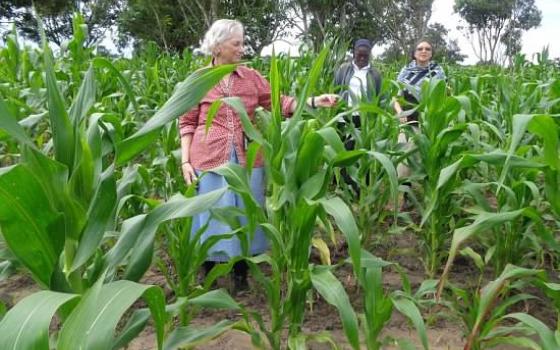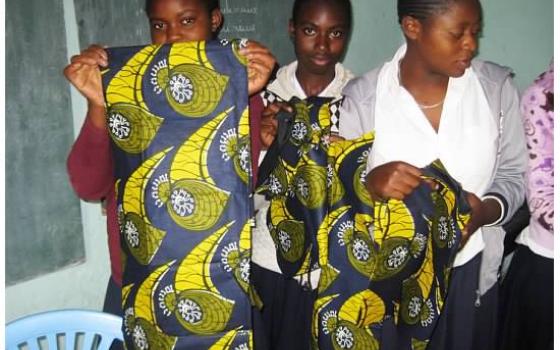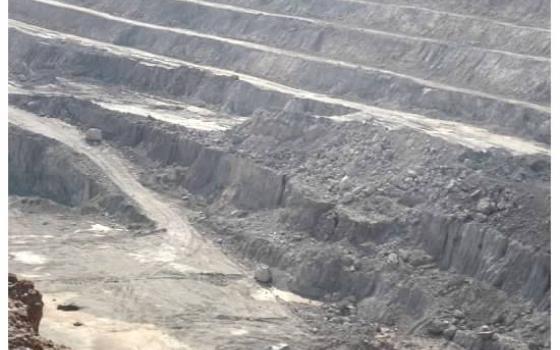Author's note: The Democratic Republic of Congo has been identified as one of the worst places in the world to be born female. The country is well known for the ongoing civil armed conflict, where rape is a regular weapon. But there is an equally devastating oppression occurring in the mining sector of the country, where overt civil war has ceased.
In 2012 three Good Shepherd Sisters from Kenya began research for a project in the mining town of Kowlezi, in the Province of Katanga. The local bishop invited them after his experience with the work of Good Shepherd Sisters in some of the poorest sectors of Kenya.
As a resource and support person who steps in only occasionally, I would like to share my view of entering the Democratic Republic of Congo reality and observing the progress that is possible in a short time with limited resources. This is a glimpse of our global world, including the massive assault on human dignity and the enduring hope of humanity.
In October 2013, I stepped from 21st century United States into an indistinct time and space. I found myself thinking 18th century as I navigated dirt roads and carried water in buckets. Immense mining gashes across the earth suggested a moonscape.
I was in Kolwezi, the Democratic Republic of Congo, in a region scarred by more than 500 years of exploitation: first internal African slave markets, then outside exploitation of resources, from ivory to rubber extraction. Colonizers dominated the political scene; indigenous populations became chattel; wealth exited to Europe.
Since the country's independence in 1960, progress has been stalled by dictatorial “strong men,” civil war and the near impossibility of establishing civil stability. Now, the exploitation and foreign dominance, coupled with corruption, are focused on the regional mineral wealth, notably copper and cobalt. If you’re not sure why cobalt and copper, think cell phone!
A continuing story of human degradation emerges from this land. It is a story of massive poverty, substandard housing, poor health and illiteracy. It is a story of widespread exposure to violence and subsistence living for working people, most of whom came from other parts of the country hoping to find opportunity. It is a false and bitter hope. The wealth of the mines never reaches them.
Still, despair lifts when you meet the people who struggle in this strange land. When real opportunity appears, the people, against all odds, respond.
Three Good Shepherd Sisters came about a year ago with a vision that included more opportunity for people to participate in society; empowerment; the reduction of abuse and violence – maybe even a change in the structures that help people back. People started calling them “the walking sisters” because they went from location to location, home to home, asking questions and listening.
As the sisters heard people’s hopes, they rolled up their sleeves. The most notable response was the opening, in collaboration with other groups, of an informal school known as the Child Development Project to which hundreds of children flocked each day. Crowded into small airless classrooms, the children exuded energy and excitement at learning the alphabet.
How can children do this when most had no breakfast that morning? I don’t know. It will be a long road towards full literacy (in both mother-tongue Swahili and civic language French). And even so, entering public schools, whose costs include fees and uniforms, will be an impossible journey for many children. But they have begun.
My task over two weeks was to help the sisters define their vision and mission and to work out child protection schemes and policies that would keep the project in line for funds. Even before the now-secured but never long-lasting funding, the sisters had begun not only the school but also an agriculture co-operative, plans for fish farming, women’s groups and income projects for teens, and ideas for young men, who also were asking for “something for us.”
In February 2014, I returned, uncertain how this little group had progressed. I was anxious as I left snowbound New York for the chaos and grime of Lubumbashi airport.
On my first visit, the Farm Alternative Livelihood program – training for an alternative to working in the mines – was just an idea; by February, extensive fields had been plowed, and gnarly roots upended, and corn was growing. Workers were developing agricultural skills in the “office” under a mango tree. And the land was living, not disfigured.
In October, the Child Development Project had about 600 children with three or four teachers. By February the children had several teachers, a child development coordinator, a nurse and a social worker. The nutrition program, once only one day per week, now covered five days, and was organized so that children whose homes have absolutely no food in them quietly received an extra portion. Yes, the staff knew each child by name.
The Economic Empowerment Program taught the basics of needle and thread last October. Four months later, adolescent girls, who have lost so much of their childhood, created their own traditional dresses to wear on International Women’s Day on March 8.
I’ll bridge these two worlds again in August, offering more training, more support. I’m quite sure I’ll see many more good changes, new developments, progress. And as the water is lugged, as electricity fails, as mud is slogged through, I will again consider the desperation and hope of globalization. This is our world. The “walking sisters” are teaching me how to embrace it fully with a tenderness that has the power to humanize.
[Sr. Clare Nolan is the International Justice Training Coordinator for the Sisters of the Good Shepherd, an international woman’s religious congregation that is involved n providing social services in about 70 counties, with a particular focus on women and girls in vulnerable situations.]



